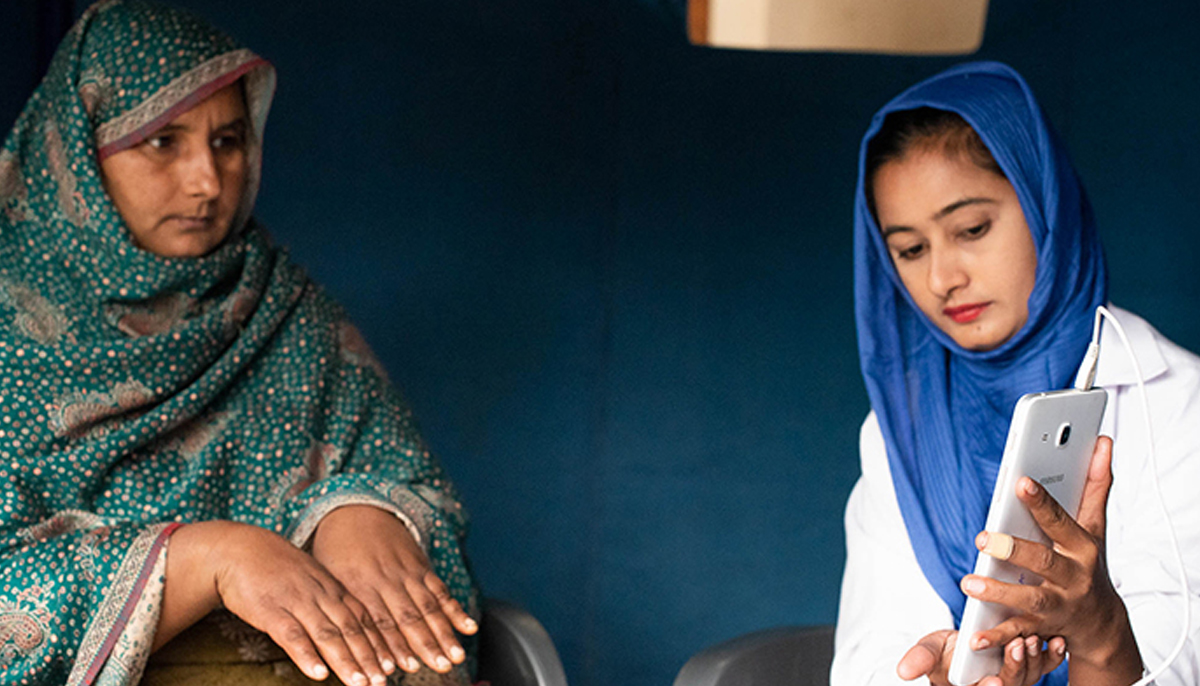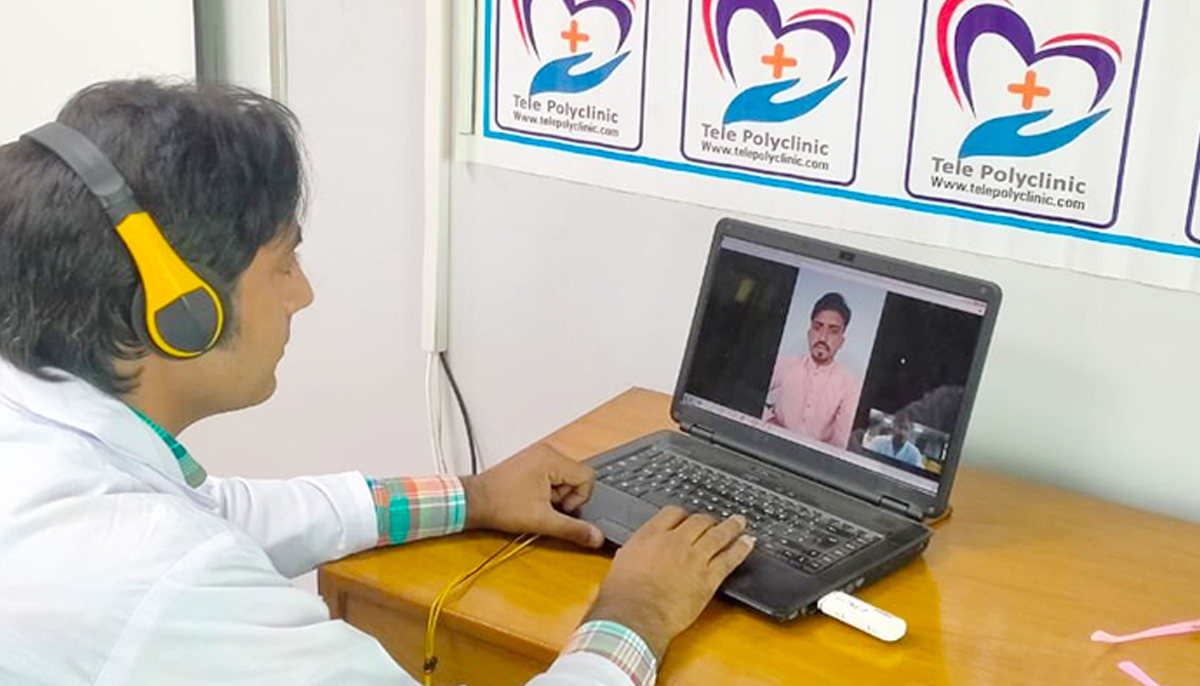KARACHI: Telemedicine is not a commonly used term in a country such as Pakistan, which is not tech-savvy and does not transit to new avenues as fast as developing countries. The advent of the coronavirus has changed that, and now even Pakistanis seem eager to learn about the use of new technology.
As hospitals continue to receive complaints from patients worried about whether they might be infected with the virus, telemedicine is trying to cater to their needs and provide medical services at home to people isolating.
Geo.tv spoke to organisations and individuals offering telemedicine services in the country to get know about the effectiveness of their prescribed treatment, the setbacks being faced by such services, and how they are changing the trend of going to the hospital for even a stomach ache.
'Ten-fold increase in calls post-pandemic'
The chief executive of doctHERs, Khaqan Sikander, talking about telemedicine said that it could be "utilised across a broad spectrum of diseases and has especially proven to be effective in psychiatry, dermatology, radiology, gynaecology, pediatrics as well as the management of chronic diseases".
Sikander, while talking about how people had been transiting towards telemedicine, said that their incoming calls had gone up "ten-fold" over the past three weeks. "People are beginning to recognise that telemedicine has a significant role to play in the delivery of high-quality healthcare in Pakistan."
"A prospective customer can connect with us via four different channels: (i) a phone-based call-in centre accessible via a designated phone number, (ii) incoming messages to our doctHERs Facebook page, (iii) skilled nurses deployed in our SMART telemedicine clinics, and (iv) female frontline health workers who are present in 16 districts in across more than 3,000 villages and towns in Pakistan."
"In our physical or virtual SMART clinics we have deployed skilled nurses (inside physical clinics) and female frontline health workers (at virtual clinics). These frontline, healthcare providers are able to measure blood pressure (BP) via a digital diagnostic device. They are also able to communicate this measurement, in real-time, to a remotely-located, female doctor who is connected to the nurse via an HD video-consultation platform. These digital, blood pressure monitors will soon be integrated into a mobile application via an API," he noted.

Talking about how profitable the business had been so far, he said: "While many telemedicine companies in Pakistan were struggling, doctHERs was able to crack a successful business model back in 2018 that enabled the organisation to be cash-flow positive (profitable) for the past 18 months. We continue to generate service-based revenues that consistently exceed costs, with a 350% increase in service-based revenue, year-over-year, comparing 2019 with 2018."
"One of the biggest challenges that we have to deal with frequently are incoming harassment calls or ‘prank’ calls that our female medical doctors receive on their smartphones. While these callers are blocked, it is a source of nuisance and detracts from the important role these female doctors have in delivering world-class healthcare to health-seekers in Pakistan," he lamented.
Sikander said that the federal government had been supportive of telemedicine, "especially during COVID-19".
He said that the Centre's recently launched technology initiative called Digital Pakistan, led by Tania Aidrus, has "integrated several telemedicine partners onto its platform and is continuously adding more service providers".
"The organisation is also a major service provider to the Federal Ministry of Health’s Yaran-e-Watan initiative which was launched a few days back. The programme focuses on engaging overseas Pakistani doctors and enlisting them to help their home nation from the comfort of either their home or their hospital/clinic in the US, UK, Canada, UAE, Saudi Arabia," he concluded.
'Blessing in disguise'
Dr Osama Zia, a medical officer at DHQ Hospital South City Okara, initiated voluntary telemedicine services after the pandemic surfaced in the country and has got a tremendous response so far.
“I started the initiative after the coronavirus emerged in the country and I treat patients via call and text,” he said.
“People have realised that they can get minor illnesses treated via phone instead of waiting in long queues and saving themselves from the possibility of contracting COVID-19 at the overcrowded hospitals,” he said. He added that patients have responded well to his treatment, as several have texted and informed him that they were cured by the prescribed medicines.
“I feel that the burden on the hospitals’ emergency wards has reduced as the people who had a stomach ache or a common cold would also rush to the hospitals to get themselves checked,” he said.
“About 60-70% of the people that I treat call with worries of being infected by coronavirus, so I ask them questions based on the guidelines issued by the government, i.e., their travel history and other relevant considerations, and then if they do not score high enough on the symptom/risk index I inform them they have nothing to worry about,” he said.
He said that like him, a female doctor had also put up her number for voluntary services to the people, but unfortunately people had flooded her inbox with inappropriate messages. “This is the beginning. Soon enough people will learn to behave on cyberspace as well.”
'With government support, we can do more'
Dr Mujeeb Rehman founder of ‘Tele Polyclinic’, tells us that his organisation is helping people on a voluntary basis on Facebook, WhatsApp, and other platforms.
They have established a website where over 1,000 doctors, ranging from GP (general practitioners), child specialists, gynecologists, to dermatologists, are offering their services to the people via text, call, and video calls — voluntarily.
“We provide consultation on our Facebook page and if the matter cannot be resolved in the comments section, then we ask the patient for their contact details. Depending on the severity of the problem, we treat them on audio call or on video chat.”
Dr Rehman said that they arrange live Facebook sessions weekly with specialists and ask people to direct their queries so that they can be answered in real-time and the people can save the money otherwise spent on going to a specialist doctor.

The organisation has also rolled out an Android application called ‘Tele Polyclinic’ where patients can ask their queries without disclosing their identities — in case they wish to share a problem they might be more comfortable talking about anonymously.
“I feel like we are creating a difference and there is scope for this in the future. If the government spends at least Rs1 billion in this sector, at least my organisation, which treats 20,000-25,000 patients a year, can treat over 100,000 people and we can lessen the burden on the OPDs and save people a lot of money as well,” he said.
'Call the doctor home'
If you feel like the services offered via telemedicine are not effective enough, then there is a Karachi-based organisation 'Find My Doctor', that treats patients at home, while charging a nominal fee.
The chief executive of the organisation, Saad Wahab, said that they have a team of over 110 doctors who provide services all over Karachi, and their GP charges Rs800 to check up on a patient at home.
“We offer lab tests as well. People can select the preferred laboratory on our application — easily available on Google Play store and App Store — and then our team gets their sample from their residence,” he said.
The organisation is currently working with six laboratories, namely, Essa Laboratory, Husaini Laboratory, National Medical Centre, National Institute of Blood Diseases, Chughtai Lab, and Hashmani Laboratory.
“Before the pandemic, we used to treat 50 patients a day. Post coronavirus lockdown, our organisation is providing services to nearly 250-300 patients in a single day,” said Wahab. He said that they have faced no hurdles after the lockdown. In fact, the business has substantially expanded and now it is hiring new doctors.
“All our staff that visits patients is equipped with personal protective equipment (PPE) due to the hazards to safety posed by the pandemic,” he said.
“People are eventually getting familiar with the service and hopefully it will expand further with time," said the enterprising doctor. “I appeal to everyone to stay at home and in case you need medical assistance, Find My Doctor will help you out.”
'The same treatment at home'
Muhammad Waqar Bhatti, a senior health reporter at The News said: “The concept is not new in our society as telemedicine means getting a checkup or asking for the doctors' opinion via telephone. But as technology became more commonplace, the method became widely used.”
“Doctors are maintaining distance with their patients at the hospitals, so why not stay at home and get the same treatment and reduce the load on the already burdened medics,” he suggested.
“The practice of home sampling has already started. People contact testing labs to collect their samples and upload the results on the laboratory’s site. So now you have the test available online, you send it to the doctor and he treats you accordingly,” he noted.
"We have several organisations working in the country, and they are doing a tremendous job as well. Among them, Ehad Medical Centre connects you with doctors across the globe, and Pakistan Islamic Medical Association links you to one of the finest doctors in the country — free of cost," he said.
Bhatti said that according to his observations, online facilities were following the SOPs issued by the relevant authorities but there needs to be an institution that regulates them vigorously, which is missing.
Header image: A doctHERs employee connecting the patient with the doctor.


